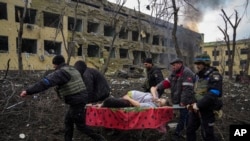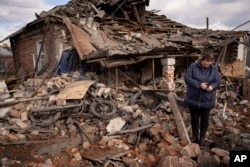Update: The ICC announced on March 17 that it had issued arrest warrants for President Vladimir Putin and Presidential Commissioner for Children's Rights Maria Lvova-Belova for their alleged role in the abduction of children from Ukraine.
On March 13, various media outlets reported the International Criminal Court (ICC) is gearing up to prosecute individuals involved in war crimes in Russia’s war in Ukraine.
The ICC will reportedly seek warrants against Russian citizens connected to Russia’s abduction of Ukrainian children and Russia’s systematic targeting of civilian infrastructure in Ukraine.
Responding to these reports, Russian Foreign Minister Sergey Lavrov said Moscow does not recognize the jurisdiction of the ICC. He also cited a pretext Moscow gave for its February 2022 invasion — to “protect civilians in eastern Ukraine” — to imply the court was using a double standard in relation to Russia.
"We do not recognize this court [the ICC], we do not recognize the jurisdiction of this court...” Lavrov said. “In general, we constantly recall that for many years no international judicial bodies — even those that we do not recognize, or other members of the international community — bothered to pay attention to the destruction of civilian infrastructure, to the killings of civilians that Ukrainian nationalists staged in Donbass.”
However, Lavrov mischaracterized what happened in eastern Ukraine’s Donbas region, which Russian forces clandestinely invaded in 2014.
While Russia refuses to recognize the ICC’s jurisdiction, the Hague-based court can investigate and prosecute certain crimes when a country cannot — or will not — investigate those crimes on its own.
Those crimes include genocide, crimes against humanity, war crimes and the crime of aggression.
The ICC can investigate and prosecute individuals who commit crimes on the territory of an ICC member, or the territory of a state “that has accepted the jurisdiction of the court.”
Individuals from ICC member countries who commit crimes somewhere else can also be prosecuted.
Ukraine, like Russia and the U.S., is not a party to the ICC.
While the U.S. helped negotiate and draft the Rome Statute, it ultimately decided against becoming a State Party to the ICC. That decision was in part informed by the belief American military members could be subjected to politically-motivated prosecutions.
Still, the U.S. has supported ICC efforts to prosecute war crimes and crimes against humanity, and U.S. President Joe Biden has called for Russian President Vladimir Putin to face a war crimes tribunal as part of efforts to hold Russia accountable for its alleged war crimes in Ukraine.
Russia withdrew from the ICC in 2016 after the court called Russia's annexation of Ukraine's Crimean peninsula an occupation.
But Ukraine has twice accepted the court’s jurisdiction over alleged crimes covered by the Rome Statute (the treaty which created the ICC) occurring on its territory.
Following Russia’s invasion last year, ICC prosecutor Karim Khan opened an investigation of the situation in Ukraine, saying “there is a reasonable basis to believe that both alleged war crimes and crimes against humanity have been committed” there. He said his probe would “also encompass any new alleged crimes falling within the jurisdiction of my Office that are committed by any party to the conflict on any part of the territory of Ukraine.”
What about eastern Ukraine prior to 2022?
Before Russia’s full-scale invasion of February 2022, President Vladimir Putin and other Russian officials falsely claimed that the Russian-speaking population of Ukraine’s eastern Donbas region was being subjected to genocide.
Putin used the conflict in Donbas to justify last year’s invasion.
However, while Russia attempted to portray its clandestine invasion of eastern Ukraine as a civil conflict, the European Court of Human Rights found that the two Russia-backed breakaway regions of Luhansk and Donetsk were, from May 11, 2014, until at least January 26, 2022, “under the jurisdiction of the Russian Federation.”
That, analysts noted, showed Russia’s invasion of Ukraine actually began in 2014, and opened the door for Russia to be held accountable for human rights abuses committed during an inter-state conflict.
Observers have provided documentary evidence that Russian tanks and other military hardware, along with regular Russian military forces, were present in eastern Ukraine before 2022.
Putin and other Russian officials and media have also repeated the false claim that up to 14,000 civilians were killed in the Donetsk and Luhansk regions from 2014-2021.
But according to data from the United Nations Office of the High Commissioner for Human Rights (OHCHR), that 14,000 figure includes 4,400 Ukrainian troops and 6,500 Russia-backed combatants.
The OHCHR estimates 3,400-3,500 civilians were killed during that period, some of them by Russian-backed forces on territory under Ukrainian control.
Some 8.8% of all civilian deaths occurred during a single incident — when a Russian missile shot down Malaysian Airlines flight MH17 over eastern Ukraine, killing all 298 people aboard.
Civilian deaths decreased in eastern Ukraine almost every year from 2014 until 2021. The majority of the deaths recorded by OHCHR happened in 2014, when an estimated 2,084 civilians were killed. Only 25 civilian deaths were recorded in 2021.
The death toll and level of destruction in eastern Ukraine increased exponentially following Russia’s 2022 invasion.
In February, OHCHR said it had confirmed at least 8,000 non-combatant deaths in Ukraine since Russia invaded one year prior, noting the “true number is likely to be substantially higher.”
Russia’s “scorched-earth campaign” has seen a number of villages, towns and cities in eastern Ukraine left in ruins.
Russia has been accused of systematically targeting civilian infrastructure, including residences, hospitals, schools, critical energy infrastructure, water supply infrastructure and water resources.
According to the U.S.-based Conflict Observatory, Moscow has “systematically relocated” at least 6,000 children from Ukraine to re-education and adoption facilities in Russia and Russian-occupied Crimea.
Under the Genocide Convention, that could constitute an act of genocide.
Meanwhile, the ICC announced on March 17 that it had issued arrest warrants for President Vladimir Putin and Presidential Commissioner for Children's Rights Maria Lvova-Belova.
Prosecutor Karim Kahn said in a statement that the ICC had collected sufficient evidence to conclude there are "reasonable grounds to believe that President Putin and Ms Lvova-Belova bear criminal responsibility for the unlawful deportation and transfer of Ukrainian children from occupied areas of Ukraine to the Russian Federation, contrary to article 8(2)(a)(vii) and article 8(2)(b)(viii) of the Rome Statute."
The statement added:
"My Office alleges that these acts, amongst others, demonstrate an intention to permanently remove these children from their own country. At the time of these deportations, the Ukrainian children were protected persons under the Fourth Geneva Convention.
"We also underlined in our application that most acts in this pattern of deportations were carried out in the context of the acts of aggression committed by Russian military forces against the sovereignty and territorial integrity of Ukraine which began in 2014."






